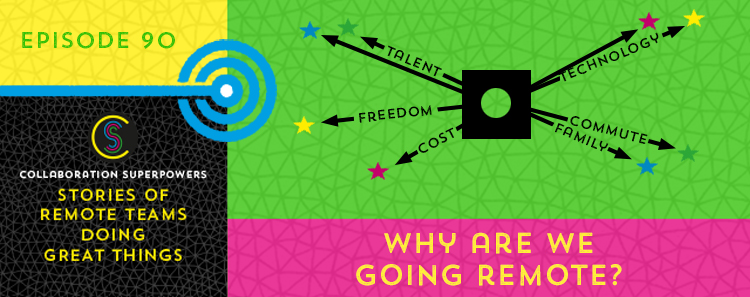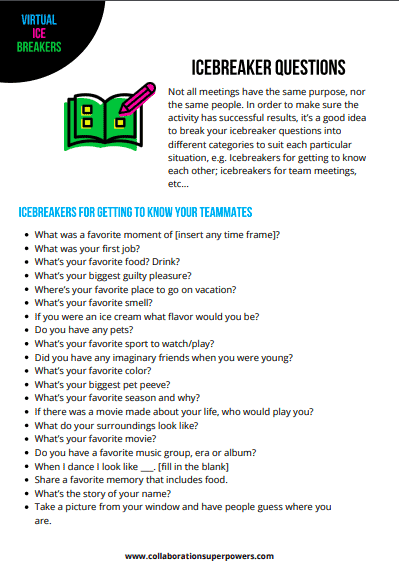
Why are more and more people and companies going remote? Freedom and profit. Being able to work from anywhere allows people to find and work on the projects they are most passionate about. This can end up being a key differentiator for businesses too. People can work on the things they love, and businesses can hire people who love what they do versus people who are just doing their jobs.
Subscribe to the Collaboration Superpowers Podcast on iTunes or Stitcher.
Why people are going remote
- TECHNOLOGY. Mobile devices, centralized data, and all kinds of apps and software are helping us stay connected to each other, wherever we are.
- WORK-LIFE FREEDOM. In the past, when we spoke of work-life balance, we assumed that work and life shouldn’t overlap or blend. Now there’s an increasing movement towards work-life fusion, where the lines between work and life are blurred.
- TYPE OF WORK. Knowledge workers, writers, graphic designers, developers, customer support, community managers, and accountants.
- PERSONALITY TYPE. Some individuals are well suited to working virtually. Whether it’s because they’re introverted, are parents, or military spouses. Some folks thrive in a remote situation.
- WE LOVE OUR FREEDOM. People value the increase in freedom when they can work remotely. To some, freedom is the ability to take a walk or a nap during the day. Others want to spend more time with family. A few want to travel the world.
- NO COMMUTE. This is a significant driver for working remotely. Commuting feels like a waste of time for most people. A painful commute can ruin an otherwise great job.
- WE CAN WORK WITH PEOPLE WE LIKE. Being able to work online means that more people globally are exposed to great projects. When we remove the issue of geographic location, we open up more options to work with people and on projects from around the globe.
Why companies are going remote
- LOWER COSTS. The cost of hiring people offshore can be significantly less than hiring local talent. The difference in salary between a programmer in San Francisco and one in Hanoi is vast.
- REDUCING/REUSING REAL ESTATE. Flexible work options can reduce the number of people that need to be in the office at the same time. Legacy buildings that can’t be sold can be turned into flexible workspaces.
- MORE, BETTER, AND SPECIALIZED PEOPLE. When companies grow, it can be difficult to find enough people in the local area, especially if you want to hire people with specialized expertise.
- KEEP EXISTING STAFF. Increasingly, companies are using flexible working arrangements to retain the people they already have and become more attractive to a wider audience. Some companies claim that hiring globally gives them a competitive advantage.
If you haven’t thought about remote collaboration options in a while, you might be surprised by what’s happening—and what’s possible for you and your company too. We’ve come a long way, and it’s getting better all the time.
Podcast production by Podcast Monster
Graphic design by Alfred Boland
More resources
Original transcript
Welcome to the Collaboration Superpowers podcast. My name is Lisette and I’m interviewing people and companies doing great things remotely. Welcome to episode 90, everybody. If my voice sounds a little strange today, it’s because I have a slight cold. So we’re going to just do the best we can. It’ll probably be a little bit lower than what you’re used to. In my interviews, I’ve been asking people and companies why they made the move to go remote. I’ve been reviewing all my notes, and I wanted to share with you some of the most common reasons that I’ve heard for why we make the decision to go virtual.
So now it’s important to distinguish between why people go remote and why companies go remote because they are very different reasons. Let’s start with why people go remote. Some type of work is particularly well suited to being done virtually. I mean work done by knowledge workers is a perfect example. So that includes writers, designers, developers, customer support, community managers, and accountants, all kinds of people.
In addition, there are certain kinds of people that are just well suited to working virtually. Whether it’s because they are introverted and they prefer working alone or because they’re parents and they need the flexibility or military spouses, for example, some people just thrive in a remote situation. In every interview that I’ve done with people and in my workshops, the number one reason that people loved being remote was freedom. Now as you can imagine, freedom looks different from person-to-person. To some people, freedom is the ability to take a walk or a run or a nap during the day. A lot of people want to spend more time with their families. A few want to travel the world. But even for the people that don’t mind working a standard, 9:00 to 5:00 schedule, a lot of people that I interviewed brought up the fact that not having to commute was a significant driver for working remotely, pun intended. Commuting just feels like a huge waste of time for most people. And from what I’ve seen, a painful commute can really tarnish any love that people have, even if the job is great. So there is the freedom to create our own schedules. That’s very appealing. There is the freedom from the dreaded commute that’s so appealing. There’s also the freedom to create the spaces where we’re most productive. So for instance, some people really thrive in an open office, and some people really thrive in a space where they’re all by themselves. But really letting people choose the space that’s most productive for the task that they’re working on, that’s a powerful combination. For those of us who love to work remotely because we’re freelancers, part of the freedom that we have is the freedom to choose the work that we like best.
So now let’s talk about the reasons why companies are going remote. The number one reason that got brought up over and over and over again was that companies were going remote to lower costs, hands-down. Now that can be costs of people and also costs of real-estate. For example, the cost of hiring people offshore can be significantly less cost than hiring somebody local. I mean if you think about it, the cost of a programmer in San Francisco is going to be very different than the cost of a programmer in Vietnam. That’s something companies can’t ignore.
Another way of lowering cost is by reducing or reusing real estate. One company that took my workshop was taking it because they were reducing their real estate space and going to [inaudible – 03:56] per person, which meant that about 20 percent of their workforce would be working from somewhere else at any given time.
But if you’re a company that has legacy buildings, for example, and you’re not able to sell those, you can turn those into other things like flexible workspaces. I interviewed an expert in doing this. He was actually the first podcast interview that I did, Chris Ridgewell from the Telework Association in the U.K. If you’re looking into reusing or reducing your real estate and thinking about flexible work options, Chris Ridgewell is the person to speak to. Again, just go to episode 1 and you’ll find his contact information there.
It’s not just cost that’s making companies go remote though. It’s also people. Sometimes it’s that they need more people because the company is growing and they can’t find enough people in the local area. It can be because a company needs specialized people. So you really need a person with a specific skill set and they simply don’t live in the area where your company is located. And something that I see more and more is that companies are using flexible work arrangements to retain the people that they already have and to become more attractive to a wider audience. Some companies that I interviewed actually claim that hiring globally gave them a competitive advantage, a clear competitive advantage.
So whether you plan to allow for flexible work options at your company or not, I think it’s actually good to have the processes in place that would allow you to work outside of the office just in case. For example, if the weather is bad or if there is a transportation strike or if you’re waiting for a package at home, the workforce is not affected because people can just keep going. Being able to work from anywhere allows people to find and work on the projects that they’re most passionate about, which can end up being a key differentiator for businesses too. And in ideal situation, people are working on the things that they love and businesses are hiring people who love what they do versus people who are just doing their jobs. If your company hasn’t thought about remote collaboration options in a while, you might be surprised by what’s happening and what’s possible for your company. I really encourage you to do some more exploring. We’ve come a long way, and it’s only getting better from here. The Work Together Anywhere workshop is a great place to start. It will help you create a smooth, high-bandwidth, non-glitchy, team experience online. You learn how to avoid miscommunications, increase comradery, run problem-free meetings where everyone contributes and inspire continuous improvement on your team and giving feedback and receiving appreciation. The workshop is offered as a one-day, in-person workshop, so it’s a full day. You can also take an online version of the workshop, which is four, one to one and a half hour sessions, all online.
And the last way to take the workshop is actually a hybrid version of the workshop. So you do part of the workshop in person and part of it online. It really just depends on what your company is looking for. Of course, I recommend the online version. You get to push all the buttons and use a bunch of tools. And what better way to learn how to work online than online. You can find more information about all of that at collaborationsuperpowers.com.
Stay tuned next week when I interview Leslie Truex from workathomesuccess.com. Talk about great tips from a pro. She’s got them. A huge thanks to Nick, the podcast monster for being a great podcast producer. You can hire him to make you a star at podcastmonster.com. And this week we’re adding on an extra thanks for the awesome Alfred Boland, the graphic designer for Collaboration Superpowers. You may have noticed the professional design transformation that’s been happening at the website lately, and that has everything to do with Alfred Boland. You can check out some of his work at bolanden.nl. It’s in Dutch but the picture speaks for themselves. All right, everybody. Until next week, be powerful.




It’s good for you to do these little retrospectives from time to time. As a fellow freelance project manager who works remotely, I appreciate the insights. I’m sure you’ve learned a lot from these interviews, and your recap means at least as much as the opinions of your subjects. Keep up the good work!
Thanks so much Dave! Indeed, I am learning a lot from the interviews – and recapping the information helps me to process ideas. I’m glad you are finding value in the podcast. I appreciate the mention on your blog.